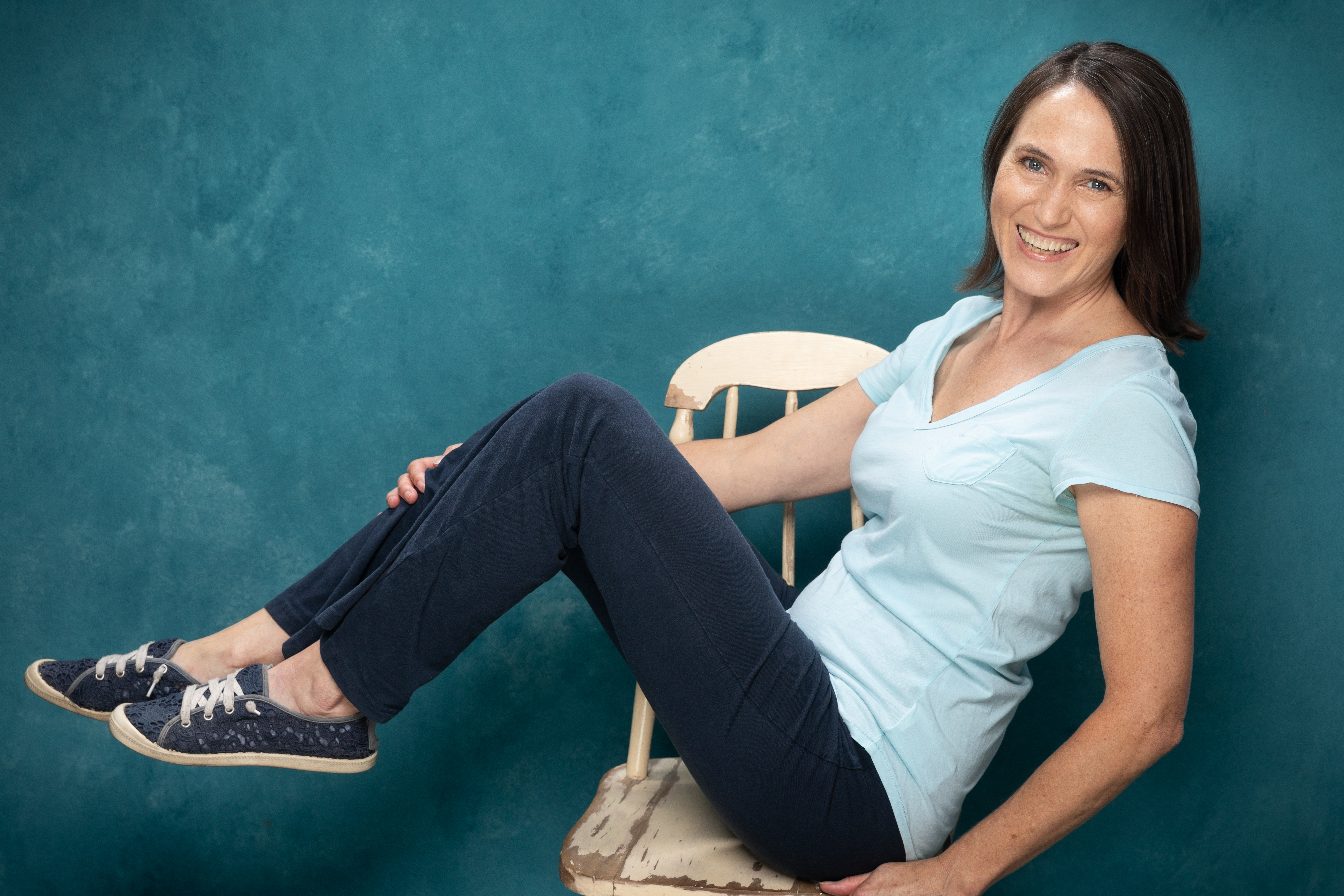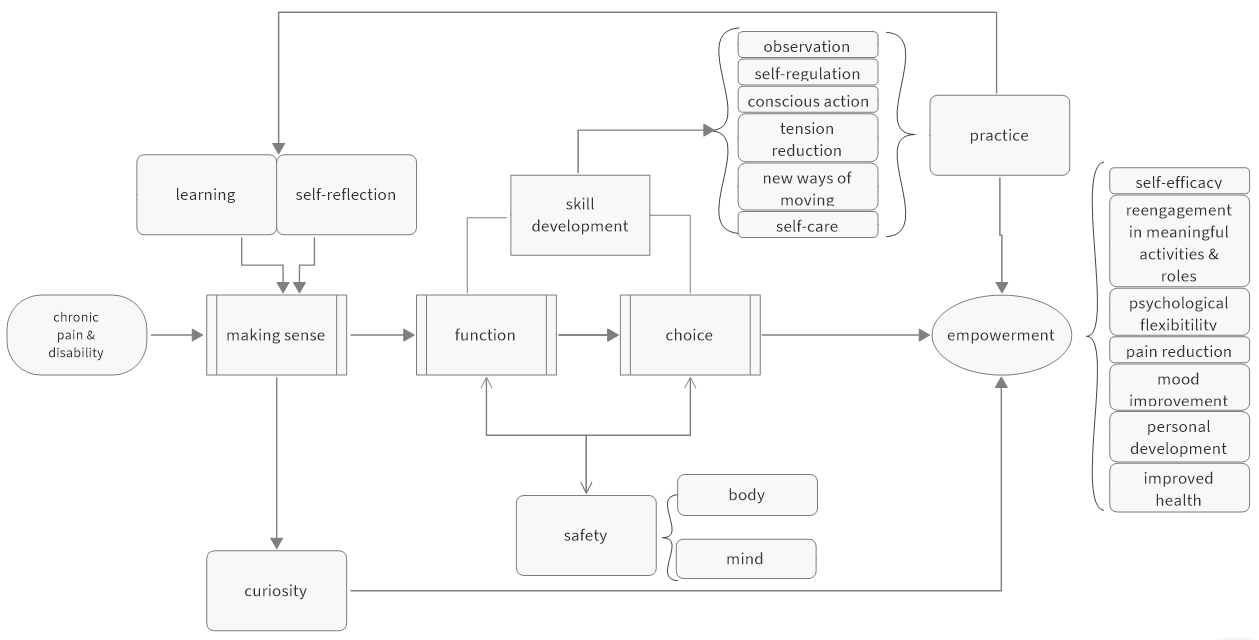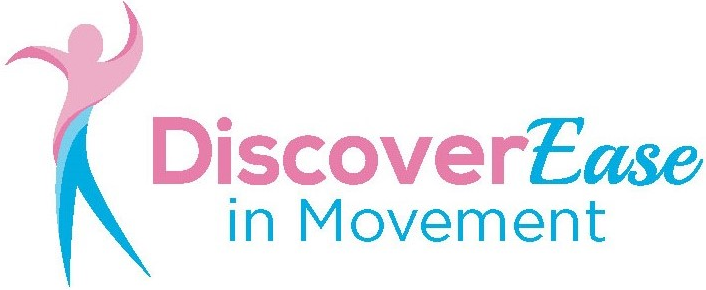About me
Mari Hodges, Pain Coach & Alexander Techique Teacher
MScMed (Pain Management), TPS, M.AmSAT

How I discovered Alexander Technique & pain science
My curiosity about pain and recovery from pain was stimulated by my own experience of chronic neck and back pain from which I have recovered. That curiosity fueled my initial solo forays into the world of pain science and further advanced study. I discovered that my own fascination with the science of pain helped me to make sense of my own pain and to help other make sense of theirs[1].
Pain also led me to Alexander Technique. Muscle spasms and neck and back pain were so bad that I couldn’t work at the computer, and much less dance. Like many people, I had a stressful job and sat for long hours at the computer, which I “balanced” with physical activity. I taught zouk lambada (a Brazilian partner dance) and danced Brazilian and Argentine dances, but I also hurt myself dancing. At the time I didn’t realize how I was contributing to my own pain in all my activities in daily life. I wanted to live free of pain and I realized I had to change something. I didn’t want to run in circles anymore as I did in my busy life, and I was ready for a new lifestyle.
I was immediately enthralled by the sense of lightness and ease I achieved with lessons. I was amazed at my ability to sit, stand and move without pain. At first these conditions would only last for a short time, but as I practiced and learned more, I became better able to sustain the changes. I learned to use the computer without hurting myself, to dance with balance and without unnecessary strain, and to live with greater ease, without unnecessary tension, stress or reactivity.
Sometimes I will still experience a flare-up, but now my better understanding and self-care skills enable me to get through it without the fear or disruption to my life of the past.
What I do
I have over a decade of experience helping people to move with more ease, benefit and enjoyment. I’m a certified Alexander Technique Teacher and Art of Running instructor. I hold a Therapeutic Pain Specialist certificate and a Master in Science in Medicine in Pain Management from the University of Sydney, a world leader in pain management programs. I continue to learn more about relearning and stay up to date with pain science, which is an ever-growing field.
My role is an educator, guide, coach and fellow explorer with clients, many of whom experience persistent pain. I do not aim to “fix” anyone’s pain. I believe in helping individuals initiate and travel along a journey toward greater health, well-being and personal transformation by inspiring and encouraging learning, curiosity and self-awareness. My help for others is founded in my own practice of this same approach and my continuing studies in pain science and rehabilitation. Through my own practice of these principles, I guide clients toward self-discovery of self-acceptance, the experience of safety within themselves, joy of moving in new ways and increased confidence in their own ability to consciously choose courses of action despite, or free of, pain.
I love to share what I learn with clients—even those who do not have persistent pain. It is inspiring to me to hear clients’ reflections on their own pain experiences and how these experiences are different from what they would have been because they have a better understanding and reduced sense of threat. This is my motivation and inspiration: empowering others to transform their own lives and live better through learning, curiosity and self-reflection.
My values
The values that imbue my practice are also the values that I seek to embody and encourage in my clients. The combination of lifelong learning, cultivation of compassionate curiosity and continued development of self-awareness underlie the process I use for myself and in my practice helping people with persistent pain. The diagram below illustrates how learning, self-reflection and skill development work together in a continuous cycle, within an environment of safe exploration, to move from chronic pain and disability to self-empowerment.

Click on image to enlarge. Definitions: self-regulation: ability to recognize and manage reactions to thoughts, feelings and happenings; self-efficacy: belief in one’s own ability to perform activities despite pain, which influences pain-related outcomes[2, 3]; psychological flexibility: ability to persist in or change behavior as a conscious response to thoughts, feelings, situations and personal goals and values[4].
Inspiring learning, curiosity and self-reflection is also a way to make self-management of pain more available to all. Active engagement in self-management is fundamental to positive change in pain and functioning[5, 6]. While individuals with persistent pain may tend to reduce and restrict activity—often influenced by their well-intentioned healthcare professionals[7, 8]—acquiring psychophysical skills of self-management can enable them to maintain involvement in meaningful activities, increase confidence and discover ways of moving that not only don’t hurt, but also contribute to well-being.
my education
I began my teacher training at the Toronto School of the Alexander Technique, and I graduated from the Escuela de Técnica Alexander de Buenos Aires. I am certified by the Society of Teachers of the Alexander Technique, and I am a member of the American Society for the Alexander Technique and the Asociación Argentina de Profesores de Técnica Alexander. I continue to learn through continuing education with master teachers. I also play the violin and enjoy dancing and running.
I have a Masters of Science in Medicine (Pain Management) from the University of Sydney, a world leader in pain management programs. I also have a Therapeutic Pain Specialist certificate and have completed numerous hours of training in pain science and rehabilitation.
My studies include:
- Masters in Science in Medicine (Pain Management) from University of Sydney, Dec. 2023
- Therapeutic Pain Specialist Certificate through Purdue University, Feb. 2021
- Completed 3-year, 1600-hour teacher training program at Escuela de Técnica Alexander Buenos Aires in 2014.
- Certified as a Teacher of the Alexander Technique by the Society of Teachers of the Alexander Technique (STAT) based in London, UK.
- Certified Art of Running Instructor, November 2016
- 4-month teaching term at Escuela de Técnica Alexander Buenos Aires
- Continuing education with world-renowned teachers of the Alexander Technique including
- Continuing education with Bruce Fertman
- Advanced Online Teacher Training with Penelope Easten
- Post-graduate training with Merran Poplar, Mariana di Paula, Reinaldo Renzo, Caren Bayer and Jeremy Chance
- Movement workshops with Lucia Walker
- Neuroscience and Biomechanics in the Alexander Technique with Dr. Tim Cacciatore and Dr. Patrick Johnson
- 32-hour teacher training in The Art of Running with Malcolm Balk
- On-going refreshers in The Art of Running with Malcolm Balk
- “Art of Breathing” seminar with Jessica Wolf
- Developmental movement with Luc Vanier
- Bodily Relearning with Benjamin Boyd, December 2023
- Master Session with Lorimer Moseley, July 2022
- Graded Motor Imagery with NOI Group, Dec. 2020
- Explain Pain with NOI Group, July 2020
- Explain Pain Applications with NOI Group, Sept. 2020
- “Know Pain: A Practical Guide to Developing Your Patient Education Skills” 2020
- “Understanding the Brain: The Neurobiology of Everyday Life,” The University of Chicago on Coursera, 2019
- “Understanding Obesity,” The University of Edinburgh on Coursera, 2019
- “Preventing Chronic Pain: A Human Systems Approach,” University of Minnesota on Coursera, 2017
- “Introductory Human Physiology,” Duke University on Coursera, 2016
- Bates Method with Jacqueline Ledesma, Opto X Ver
- Continuing work exchange with teacher colleagues
- Violin lessons and improvisation with Sami Abadi (Buenos Aires)
- Violin at La Academia Tango Club O.T. La Reserva
- Courses in nonviolent communication with Jacob Sluijter and Ronnie Hausheer
my Publications
- Hodges, M., & Cacciatore, T. (2023). Modern Pain Science and Alexander Technique: How Might Alexander Technique Reduce Pain? https://alexandertechniquescience.com/general/modern-pain-science-and-alexander-technique-how-might-alexander-technique-reduce-pain/
- Hodges, M. (2020). Alexander Technique helps musicians change harmful habits and enhance expression. Cadenza, 64(2).
- Hodges, M. (2018). My Discovery of a Painless Way to Translate (Better). In Translator Perspectives: Japan Association of Translators.
The future
My goals for the future center around making pain self-management education available to a wider population. This includes my desire to address outdated beliefs about pain by providing education to healthcare professionals of various disciplines on fundamental pain science and clinical implementation. It also includes my desire to influence the way pain is addressed by healthcare: I am committed to advocating for change that enables healthcare professionals to focus on the root causes of pain and provide person-centered, multidisciplinary treatment. I will direct my energies toward these goals as I continue to update and increase my skills and knowledge in effective pain treatment to help improve the lives of my clients.
Become a Member and Get Discounts on Classes
Sign up for one-on-one coaching and group classes, view a pre-recorded class or contact me to find out about on-site courses and workshops.
Schedule a free consultation.
Contact me for more information.
